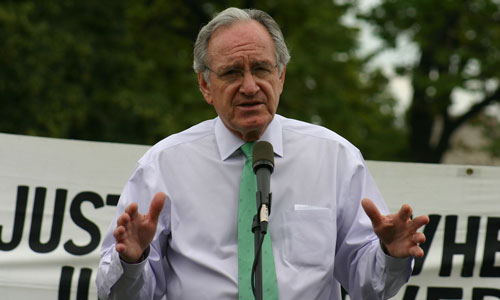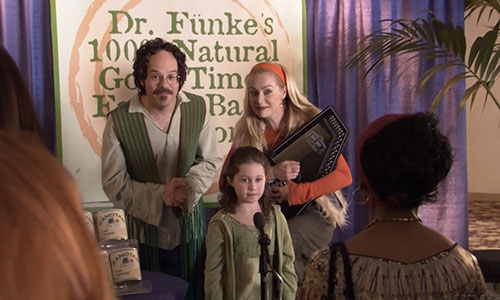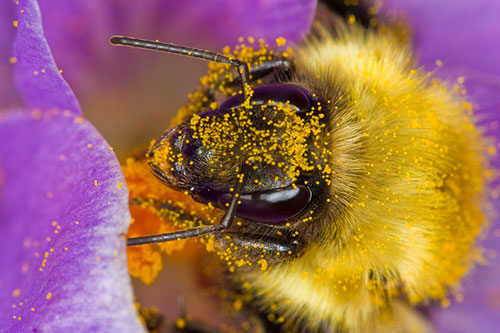The Drugs Don't Work
Why are we so ready to look toward alternative medicine when the regular kind of medicine generally does the job? Maybe it's a tonal thing.
"I'm a little off my game because right before I walked out here, I got some results I was disappointed about. I had been non-detectable, non-detectable and checking the blood every week, and then found out the numbers are back up."
— Charlie Sheen, the world's most famous HIV-positive person at the moment, telling Dr. Oz earlier this month that his HIV levels, which were undetectable, went up because he stopped taking his pills. The reason they went up? Sheen, apparently working on some not-great advice, got in touch with a guy named Dr. Sam Chachoua, a Mexico-based doctor who claims to have found cures for cancer, AIDS, and a wide variety of other illnesses. Chachoua gave him an alternative form of medication which appears not to have worked. Chachoua is not a licensed doctor in the United States, and this page offering a take on Chachoua's appearance on Dr. Oz tells you everything you need to know about him.
So What the Heck is "Alternative Medicine," and Why is it so Appealing?
Why would Charlie Sheen, or anyone else for that matter, decide one day to stop taking a prescribed medication that's actually doing its job, or choose a treatment that eschews decades of medical research in favor of a guy that even Dr. Freaking Oz, Mr. Green Coffee Bean Extract himself, thinks is beyond the pale as a medical doctor?
Sheen is rich—when it comes to doctors and medication, he can afford some Hot Shots. (Sorry.)
But Sheen still went to go seek the not-easy-to-find Chachoua out, claiming an interest in being a "guinea pig." As soon as he figured out that it didn't work, he switched back to his traditional regimen.
Beyond the constant efforts to make "tiger blood" jokes, what makes someone do that? Perhaps the answer can best be summed up by Anthony Campbell, a noted expert on homeopathy and acupuncture who once was a resident physician at the Royal London Homeopathic Hospital. Campbell, while an expert in topics generally considered alternative medicine, makes a point of simultaneously remaining skeptical of alternative medicine.
(Alternative medicine, by the way, is broadly defined as an unsanctioned form of treatment that is used as a replacement for traditional medication.)
In an essay on his website, Campbell aims the discussion not at the world of medicine but the world of philosophy. He specifically mentions the work of philosopher William James, who looks at the left-brain right-brain split and finds two approaches: "tough" and "tender."
"The tough think of the tender as sentimentalists and soft-heads. The tender feel the tough to be unrefined, callous, or brutal," James wrote in his 1907 book Pragmatism. "Their mutual reaction is very much like that that takes place when Bostonian tourists mingle with a population like that of Cripple Creek. Each type believes the other to be inferior to itself; but disdain in the one case is mingled with amusement, in the other it has a dash of fear."
Applying this thought process to medicine, Campbell suggests that the rational approach to medicine tends to come off a bit cold and calculated for some people—particularly since we often never see the same doctor, meaning that there's no interest in us as a patient—and that leads people to find different options.
Alternative medicine, as a result, takes on the same mind space as a Daniel Johnston song or a Duplass brothers film—the fact that it's unpolished and warm adds to its appeal. The problem, however, is that alternative medicine often comes with a bunch of other stuff that is arguably more problematic than the cold, calculated thing that users are trying to avoid.
"The alternative practitioners don't just extend tender loving care to their patients; they also provide them with a complex web of belief systems," Campbell writes in his essay.
Maybe Charlie Sheen just wants his medical experience to be less formulaic than an episode of Two and a Half Men. Thing is, however, he's not the only one.
38%

(LCCR & LCCREF/Flickr)
The Senator Who Became Obsessed With Bee Pollen
Tom Harkin isn't a doctor, but he knows what he likes. And the Iowa Democrat, who retired in 2015, learned to greatly appreciate alternative medicine during his three decades in Congress.
The turning point came in the early '90s, when Harkin—who had tons of problems with allergies over the years—found something that he said took care of his problems. It was a bee pollen-based dietary supplement called Aller-Bee-Gone, which he said zonked out his symptoms unlike anything else. Well, after he took like a hundred pills.
“It's the most bizarre thing that ever happened to me,” Harkin explained to the Washington City Paper in 1993. “But I want you to know something: I've had my allergies completely cleared up. My nose doesn't run. My eyes are cleared up. I don't sneeze any longer.”
(morganglines/Flickr)
Unlike most people with allergies and an affinity for alternative medicine, Harkin had power to do something about it—specifically, the ability to add amendments to funding legislation for the National Institutes of Health. In 1991, he added $2 million in funding to the NIH's budget to create the Office of Alternative Medicine—basically to create a mechanism to research whether these methods, which hadn't really been researched, were worth diving into deeper.
The medical and scientific worlds, which run on research defined by the scientific method, weren't exactly so hot on testing stuff that they openly considered quackery, and Harkin himself ran into a roadblock within OAM after its first leader, Joseph Jacobs, actually required the organization to research whether this alternative medicine stuff actually worked.
"I'm turned off by the idea of cures immediately," Jacobs told the New York Times in 1993. "When I hear that word, my defenses go up. Our challenge is to get people in the alternative-medicine community away from the panacea notion and to be more realistic about what they're trying to say."
(Jacobs failed to do so; he resigned the next year, claiming that Harkin was using his authority to force alt-medicine gurus on the OAM board.)
Undaunted, Harkin kept using his ability to get the issue in funding bills to continually raise the organization's budget and standing. In 1998, he got the standing of OAM upgraded to that of a medical center, then renamed to the National Center for Complementary and Alternative Medicine—with a budget upgrade to match the upgraded standing. These days, the center is known as the National Center for Complementary and Integrative Health (NCCIH).
Despite directly driving hundreds of millions of dollars into research for alternative medicine based on a personal interest in the issue, Harkin admitted that he was disappointed by the results—in part because the organization he launched seemed set on gathering evidence against alternative medicine.
"I think quite frankly that in this center, and previously in the office before it, most of its focus has been on disproving things, rather than seeking out and proving things," Harkin said during a 2009 committee hearing.
(Anyone with experience in science would tell you that he's complaining about a crazy thing called the scientific method.)
The existence of this center still drives critics of alternative medicine crazy, something best exemplified in this line on the RationalWiki page for the center: "If you could find any government agency that RationalWiki would advocate cutting immediately, this is it."
“I began to feel livelier and healthier. In particular, the severe colds I had suffered several times a year all my life no longer occurred. After a few years, I increased my intake of vitamin C to ten times, then twenty times, and then three hundred times the RDA: now 18,000 milligrams per day.”
— Linus Pauling, an early advocate for the the usage of vitamin C, discussing how he became a convert and advocate of the vitamin. Pauling's advocacy for vitamins as a cure for pretty much any disease led to the growth of a multivitamin industry, despite the fact that there was little in the way of proof for these claims. Author Paul A. Offit, who wrote about the issue (and alternative medicines in general) in his book Do You Believe in Magic?, points out research showing that multivitamins are more likely to cause health problems. Oh, and that Pauling died of cancer.
These days, different kinds of alternative medicine are so common that we don't even think of them in that mindset anymore. Massage is considered a form of alternative medicine, according to the NCCIH; so is yoga.
On the other hand, there are benefits to some of these solutions that are hard to ignore—as has been proven by research. Mindfulness techniques, for example, are a great way to focus energy away from the negative so that one can focus on what's ahead.
But the problem is that we have a natural tendency to question things assumed to be proven by research. As I was writing this, the rapper B.o.B. (who got into an entertaining debate with Twitter this week over whether the Earth is flat) was basically highlighting this point in action.
"I'm going up against the greatest liars in history … you've been tremendously deceived," he wrote on Monday.
How can we convince B.o.B. that all those crazy science folks might have a point?
:format(jpeg)/2018/01/okiygs4i7qbvschm7oey--1-.gif)
/2018/01/okiygs4i7qbvschm7oey--1-.gif)



/uploads/ernie_crop.jpg)